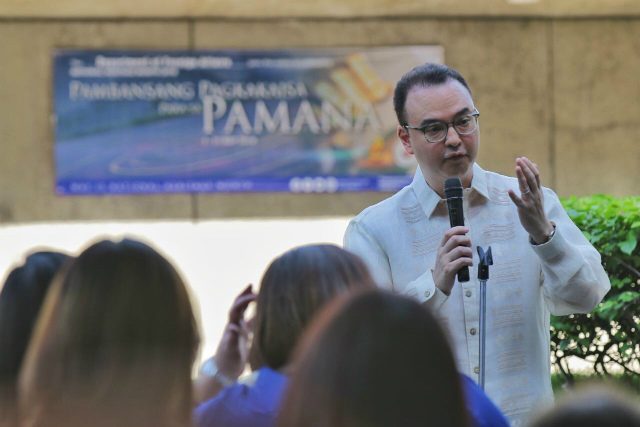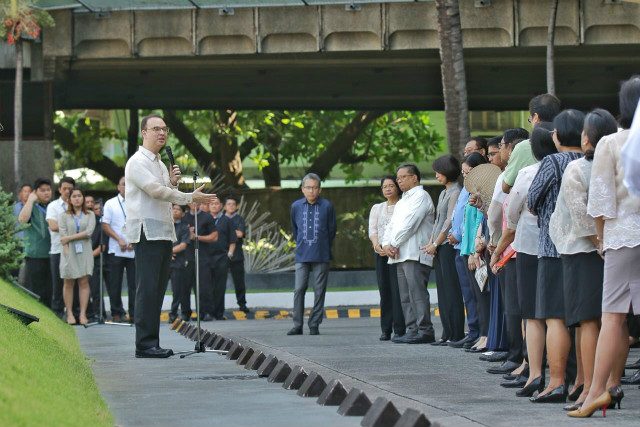SUMMARY
This is AI generated summarization, which may have errors. For context, always refer to the full article.

MANILA, Philippines – Foreign Secretary Alan Peter Cayetano lectured career diplomats at their department’s flag-raising ceremony on Monday, May 28, about diplomacy and the West Philippine Sea (South China Sea).
Cayetano tackled these two issues in a 37-minute speech at the Department of Foreign Affairs (DFA) on Monday morning.
In the summer heat, career diplomats listened to Cayetano’s over half-hour speech while standing in front of flagpoles outside the DFA building.
Cayetano, a long-time politician who has worked at the DFA for only a year, used metaphors such as a neighborhood squabble to teach diplomacy to veteran diplomats, who have mastered foreign relations for decades.
Many diplomats, who had to pass a grueling foreign service officer exam, met his remarks with raised eyebrows.
Cayetano, a Christian known to quote the Bible in almost all his speeches (even before diplomats from Muslim countries), began by talking about the “two elements of faith” – hope and trust.
“I’m talking about this because much of diplomacy is about faith, it’s about trust, and it’s about hope,” Cayetano said.
Negotiations compared to neighbors’ quarrel
Cayetano then talked about negotiations. He compared it to a family quarrelling with neighbors.
This was how Cayetano explained diplomatic negotiations, based on the official transcript provided by the DFA:
Sa pamilya, puwede bang lahat kayo nagne-negotiate? Kung halimbawa, nagkagulo, nag-away kayo ng kapitbahay ‘nyo. Kung ‘yung buong pamilya ng kabila at 13 sila, kasama na mga apo’t pamangkin. Kayo naman, 15, kasama din ang lolo’t lola at pamangkin, magsuguran kayo. Magkakaintindihan ba kayo? Hindi. So somehow, someone wiser has to step in and say, “Sandali lang. Si Mommy na ang pupunta.” Sa kabila naman, “O si lolo na ang pupunta dahil ‘yan ang diplomat sa ating pamilya.” And before you go, nagmi-meeting kayo: “Lolo, ‘wag kang papayag ng ganito.” “Lolo, siya talaga nag-umpisa ng ganito.” Sa kabila naman, “Mommy, na-onse na tayo niyan noong una. Nag-negotiate na kayo. Ngayon, dapat mayroon tayong kasiguruhan.”
(In a family, can it be the case that all of you will negotiate? Take, for example, if you have a squabble with your neighbor. If your neighbor’s family has 15 members, including grandchildren and nephews, while your family has 15, including grandparents and nephews, then you confront each other, will you reach a resolution? No. So somehow, someone wiser has to step in and say, “Wait a minute. Mommy will handle this.” Then, on the other side, “Grandpa will handle this because he’s the diplomat in our family.” And before you go, you will have a meeting: “Grandpa, don’t agree to this condition.” On the other side, “Mommy, they fooled us the other time. You already negotiated. Now we should have certainty.”)
When you send the two diplomats, you have faith in them but you trust them. If you don’t trust them, don’t send them. But if you do send them, trust them.
Because ano mangyayari when you send them, you get back and ayaw niyo, balik kayo sa gulo. Then the next diplomat you send, hindi rin magkakaroon ng tiwala.
(Because what will happen when you send them, you get back and say you don’t want it? Then you return to conflict. Then the next diplomat you send will not gain their trust as well.)
He also reminded DFA personnel that there is room for dissent under his leadership. At the same time, he said Duterte’s voters were not blind or deaf when they voted for him.
This was how Duterte’s defeated running mate put it, in reference to Duterte’s stance on the West Philippine Sea:
It is in almost all the debates, in the interviews, this has been discussed. Meaning, hindi bulag, hindi bingi ang ating mga kababayan noong binoto siya. They know what he stood for, they know his priorities. That doesn’t mean there is no area or walang puwang for advice, for dissent. Meron po. Meron.
(It is in almost all the debates, in the interviews, this has been discussed. Meaning, our countrymen were not blind or deaf when they voted for him. They know what he stood for, they know his priorities. That doesn’t mean there is no area or there is no room for advice, for dissent. There is. There is.)
But we have to ask ourselves as Filipinos: Anong mas importante sa atin? Sarili natin? Kasikatan natin? Mas importante ba na makilala ako bilang foremost expert sa South China Sea? Mas importante ba sa iyo na buong mundo, ikaw ang kinilalang lumaban sa isang higanteng bansa katulad ng China?
(But we have to ask ourselves as Filipinos: What is more important for us? Ourselves? Our fame? Is it more important to be known as the foremost expert on the South China Sea? Is it more important for you that in the whole world, you’re best known to have fought against a big country like China?)
Or is it important for you to embrace the national interest, and to accept when things are going well, if things are being done correctly, you say “Yes”? But also when things are being done wrong, mag-reklamo ka (you will complain)?
Philippines-China like husband-wife
Cayetano also denied that the Philippines is silent about China’s behavior in the West Philippine Sea, even as the country refuses to publicize any diplomatic protest against Beijing.
He compared the Philippines and China to a husband and wife.
This was how Cayetano, a married man, explained it:
Gusto nila, bumalik tayo sa panahon na every single time, nag-aaway tayo ng China. So sabi nila silence is acquiescence. First of all, we’re not silent. Just because we’re not shouting at each other and press con everyday, that doesn’t mean we’re silent.
(They want us to return to the period when every single time, we were fighting with China. So they said silence is acquiescence. First of all, we’re not silent. Just because we’re not shouting at each other and holding press conferences every day, that doesn’t mean we’re silent.)
Half of you here or less are married. ‘Pag tiningnan ka nang masama ng asawa mo at hindi niya gusto ‘yung ginawa mo, is that silence? Is that acquiescence? When I wear something that my wife thinks is too young or too bibo, isang tingin pa lang niya sa ’kin, she does not have to announce a diplomatic protest sa media, she does not have to call me out in front of all my friends and family. Sa tingin pa lang niya. Pero silence lang ‘yun, sa bibig. Pero sa action, hindi silence ‘yun kasi alam ko na ang gusto niyang sabihin, so palit ako ng damit or the way I talk or whatever.
(Half of you here or less are married. If your spouse gives you a dagger look and doesn’t like what you did, is that silence? Is that acquiescence? When I wear something that my wife thinks is too young or too cool, she just needs to give me one look, she does not have to announce a diplomatic protest to the media, she does not have to call me out in front of all my friends and family. Only with one look. But that is silence only with the mouth. But in her actions, that is not silence because I know what exactly she wants to say, so I will have to change my clothes or the way I talk or whatever.)

Why no DFA forums on South China Sea
In his speech, Cayetano also explained why he is not sponsoring any symposium on the South China Sea.
The only reason why I am not sponsoring, or asking you to sponsor debates, symposiums, or speakers on the South China Sea – because I attended some of these abroad. And abroad, bawat detalye, bawat batas, bawat opportunity, pinag-uusapan. (And abroad, every detail, every law, every opportunity is being discussed.) They free their mind of opinion. I don’t know who said it, but someone said it na: “You want to know the truth? Get rid of your opinions.” Kasi sometimes, sa ‘yo ‘yung truth kung ano lang ‘yung opinion mo. (Because sometimes, for you, the truth is only your opinion.)
Ang problema sa Pilipinas, ‘pag nagkaroon tayo ng any kind of activity in the South China Sea, ang tingin ng media at ang tingin ng advocates, dalawa lang: pro-China ka or anti-China ka. (The problem about the Philippines is, whenever there is any kind of activity in the South China Sea, the media and the advocates only think of it in two ways: You’re pro-China or anti-China.)
The issues are much, much more complicated than that. That’s why zones of peace, that’s why joint development, and that’s why joint exploration are being done around the world. But even that cannot be discussed in the Philippine setting without distorting the facts.
“I’m telling you this today,” Cayetano said, “not to put a rest on this issue, but to put a rest on any doubt in your mind that we are not defending our nation’s interest.”
Closing his monologue, Cayetano said, “So I’ll end there. But I hope that this not-so-short talk this morning would give you the pride that hindi man tayo palaaway parati, hindi man tayo nagsisigawan (while we may not be always in fighting mode, while we may not always be shouting), we are standing up for our country.
Below is the full 10-page transcript of Cayetano’s speech, as prepared by the DFA:
Cayetano delivered this speech as the DFA draws flak for refusing to publicize any diplomatic protest against China even after the Asian giant installed missiles and landed bombers in the South China Sea.
Cayetano’s predecessor, former foreign secretary Albert del Rosario, earlier urged the Duterte administration to file a diplomatic protest against China’s bombers.
Duterte, however, has said the Philippines needs to stay “meek and humble” to gain the “mercy” of the likes of Chinese President Xi Jinping. – Rappler.com
Add a comment
How does this make you feel?
There are no comments yet. Add your comment to start the conversation.